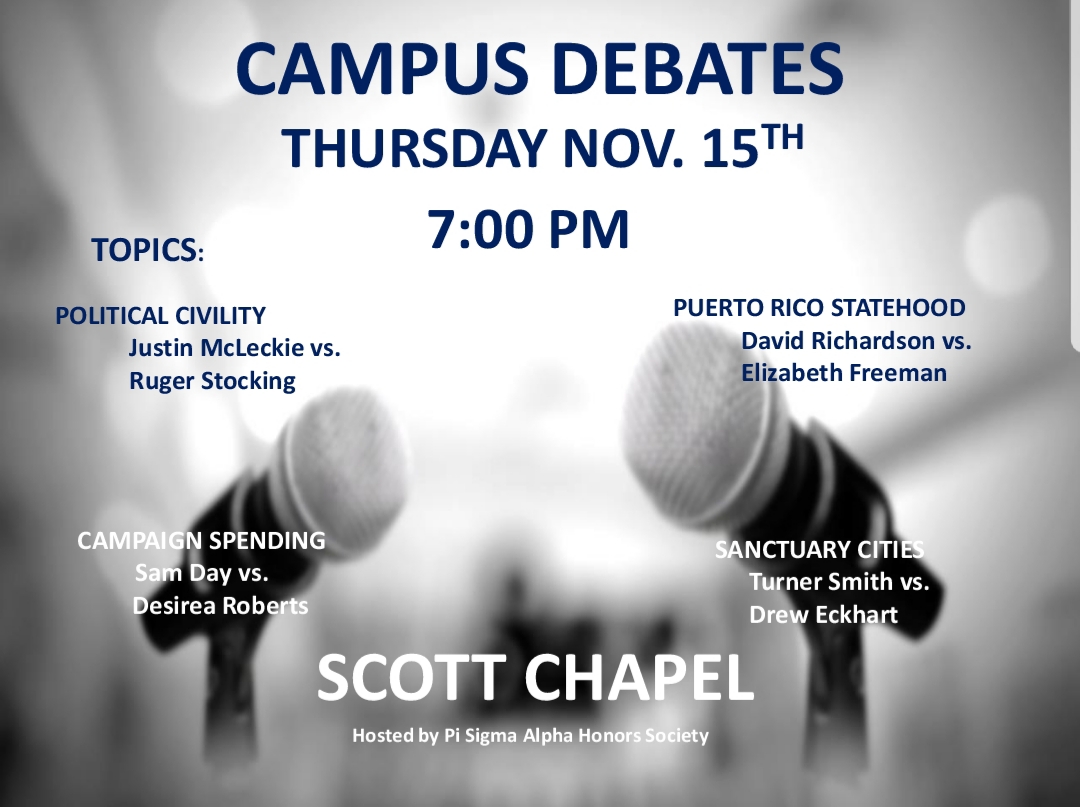The topics of political civility, Puerto Rico statehood, campaign spending and sanctuary cities will be presented and examined by eight Oklahoma Christian University students with varying viewpoints during tonight’s student debate.
The Ethos-approved discussion, which will take place in Scott Chapel at 7 p.m., will be moderated by communications professor Brian Simmons and will be hosted by the Pi Sigma Alpha Honors Society, featuring students across all classifications from the Department of History and Political Science.
Turner Smith, a junior and avid participant in the Oklahoma Christian Political Science events, said the debate works to perform a variety of functions.
“Students who are in entry-level American politics courses get an example of what political discourse looks like,” Smith said. “That is something we don’t see as often today in this administration and in recent years. There has been a serious downturn in terms of quality political dialogue, so we want to provide a good example of that and give students on campus access to multiple viewpoints on key issues in the process.”
Smith said the debate is not the only way to get involved in this style of activity and wants students to know discussions are not dominated just by political categories.
“We have a couple areas on campus where students can get more involved in discussing all kinds of ideas—they don’t have to be political,” Smith said. “Taking Sides Chapel meets every Tuesday at 11:00 a.m. and there is a debate in there every week—sometimes it’s political, sometimes it’s not. We also have a mock trial program that gives students the opportunity to participate in law and the campus debates themselves are open to everyone.”
Sam Day, a participant in the debate discussing campaign spending, said the discussion is essential in spurring knowledgeable talk regarding current issues and is worth being in attendance.
“It is important in fostering intellectual conversation and discussion on campus while helping us come together on important issues,” Day said. “You can expect some fireworks. It’s going to be a good time.”
Below is a brief summary of each category students will present on during the debate:
Political civility
With the 2016 presidential campaign highlighting this problem, political civility has marked a rise in confrontational politics. Many specialists believe this can be linked to President Donald Trump’s actions, word choice and social media involvement, while others claim biased news reporting and overreacting to opposing political stances facilitates the issue.
Puerto Rico statehood
Puerto Rican residents voted for U.S. statehood with an overwhelming majority. As a U.S. commonwealth nation since 1898, the ties between Puerto Rico and the U.S. have strengthened over the last century and citizens even pay into Social Security. They have the ability to vote in presidential primaries but not in the general election, and a member in the House of Representatives can vote in committees but not on the floor.
Campaign spending
The 2018 elections are recognized as the costliest mid-term in history. There is a stigma associated with campaign spending, which links the donations with special interest groups and potentially illegal enterprises. There is speculation that some politicians have the potential to be “bought,” while others think any effort to stop the spending violates free speech and assembly.
Sanctuary cities
The term “sanctuary city” refers to a city safeguarding undocumented immigrants by refusing to cooperate with the U.S. Immigration and Customs Enforcement Agency. Many venture to say cities like San Francisco, Seattle and Chicago should be negated federal funding because they lack compliance with U.S. immigration laws, while others believe the cities protect citizens and undocumented immigrants from crime and mistreatment.











Be First to Comment